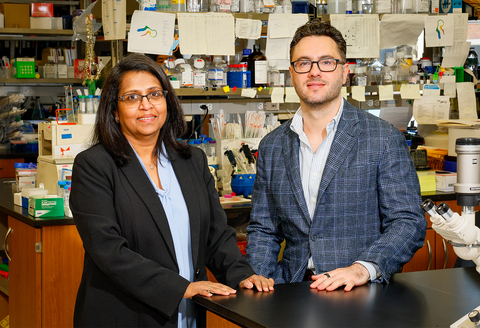Non-invasive ultrasound stimulation of the spleen reduces inflammation in humans, new results from a clinical trial
Non-invasive ultrasound stimulation of the spleen reduces inflammation in humans, new results from a clinical trial
Bioelectronic medicine researchers at the Feinstein Institutes for Medical Research, in collaboration with GE Research, publish a paper in the journal Brain Stimulation
MANHASSET, N.Y.--(BUSINESS WIRE)--We’ve all seen ultrasound images from glowing moms-to-be; now, researchers at The Feinstein Institutes for Medical Research, in collaboration with GE Research, have harnessed ultrasound technology to non-invasively reduce inflammation in the body. Results from human studies published in the journal Brain Stimulation point to the possibility of using bioelectronic medicine and neuromodulation to treat inflammatory diseases traditionally treated only with drugs.
Led by Feinstein Institutes’ Sangeeta S. Chavan, PhD, and Stavros Zanos, MD, PhD, along with GE Research’s Christopher Puleo, PhD, senior principal engineer and Jeff Ashe, MS, principal engineer in biomedical electronics, delivered spleen-focused ultrasound stimulation (FUS) or sham stimulation, to 70 healthy participants. Through careful blood analyses and measurements, they investigated the levels of endotoxin-induced tumor necrosis factor (TNF), an inflammatory protein that is released by white blood cells and circulates in the bloodstream. They found that spleen FUS has an anti-inflammatory effect, lowering TNF production from blood cells for more than 2 hours, with TNF returning to baseline levels by 24 hours after stimulation; sham stimulation has no effect on TNF production.
“From diabetes and obesity to cardiovascular diseases and cancer, inflammation is a major pathogenic mechanism in many diseases,” said Dr. Zanos, associate professor at the Feinstein Institutes’ Institute of Bioelectronic Medicine. “These first-in-human results are exciting because they demonstrate the potential ultrasound stimulation therapy holds to treat diseases, non-invasively, with existing technology.”
Preclinical research previously conducted by the Feinstein Institutes and others has shown that FUS targeting the spleen activates anti-inflammatory responses; this new study demonstrates these effects for the first time in humans. In 2021, the Feinstein Institutes and GE Research team showed the anti-inflammatory effects of liver-focused ultrasound on obesity in preclinical models. In 2022, Drs. Chavan and Zanos, along with GE Research and other collaborators, showed the ability of ultrasound to reverse diabetes in preclinical studies.
“The idea that we can use non-invasive ultrasound stimulation rather than drugs to treat inflammatory diseases is exciting,” said Dr. Chavan, professor at the Institute of Bioelectronic Medicine at the Feinstein Institutes. “Building off decades of research, these results in humans help set the stage for more clinical studies that may one day lead to additional therapies for patients in need of care, beyond traditional pharmaceuticals.”
Our body’s immune response to infection and disease is controlled through neural mechanisms mediated via the vagus nerve. Discovered in the lab of Kevin J. Tracey, MD, the Feinstein Institutes’ president and CEO, they dubbed this communication pathway the “inflammatory reflex,” which helped create the field of bioelectronic medicine.
“We are at a tipping point because it is increasingly becoming clear that new technology, new devices and new stimulation can treat inflammatory diseases,” said Dr. Tracey, Karches Family Distinguished Chair in Medical Research. “Drs. Chavan and Zanos’ work with GE Research is a major advance in the field of bioelectronic medicine.”
The Feinstein Institutes is the global scientific home of bioelectronic medicine, which combines molecular medicine, neuroscience and biomedical engineering. At the Feinstein Institutes, medical researchers use modern technology to develop new device-based therapies to treat disease and injury.
Built on years of research in molecular mechanisms of disease and the link between the nervous and immune systems, Feinstein Institutes researchers discover neural targets that can be activated or inhibited with neuromodulation devices, like vagus nerve implants or ultrasound technologies, to control the body's immune response and inflammation. If inflammation is successfully controlled, diseases – such as arthritis, pulmonary hypertension, Crohn’s disease, inflammatory bowel diseases, diabetes, cancer and autoimmune diseases – can be treated more effectively.
About the Feinstein Institutes
The Feinstein Institutes for Medical Research is the home of the research institutes of Northwell Health, the largest health care provider and private employer in New York State. Encompassing 50 research labs, 3,000 clinical research studies and 5,000 researchers and staff, the Feinstein Institutes raises the standard of medical innovation through its five institutes of behavioral science, bioelectronic medicine, cancer, health system science, and molecular medicine. We make breakthroughs in genetics, oncology, brain research, mental health, autoimmunity, and are the global scientific leader in bioelectronic medicine – a new field of science that has the potential to revolutionize medicine. For more information about how we produce knowledge to cure disease, visit http://feinstein.northwell.edu and follow us on LinkedIn.
Contacts
Matthew Libassi
631-793-5325
mlibassi@northwell.edu

